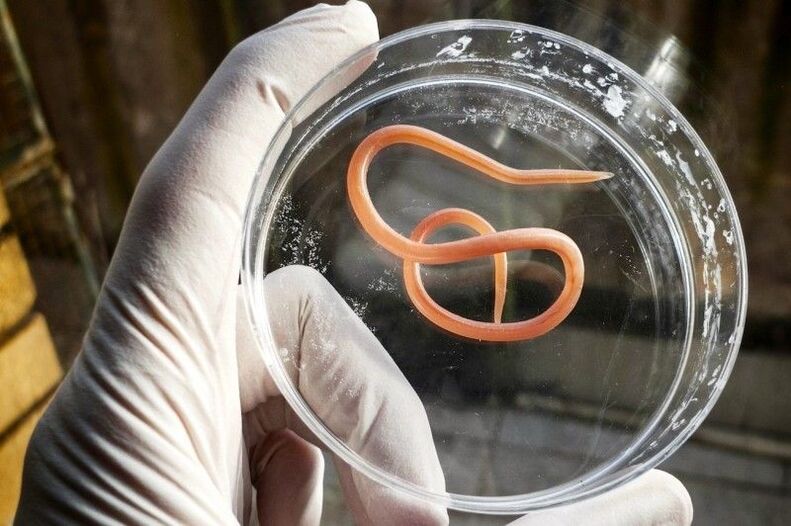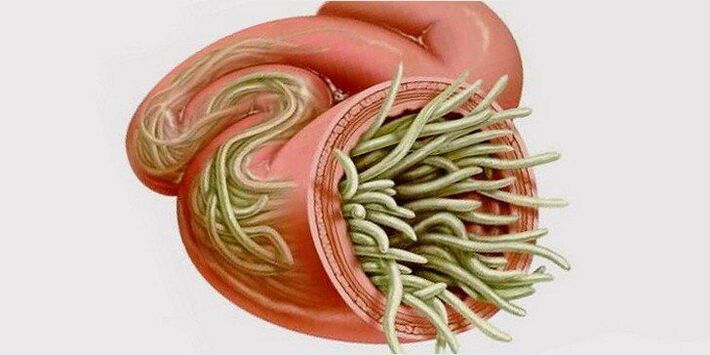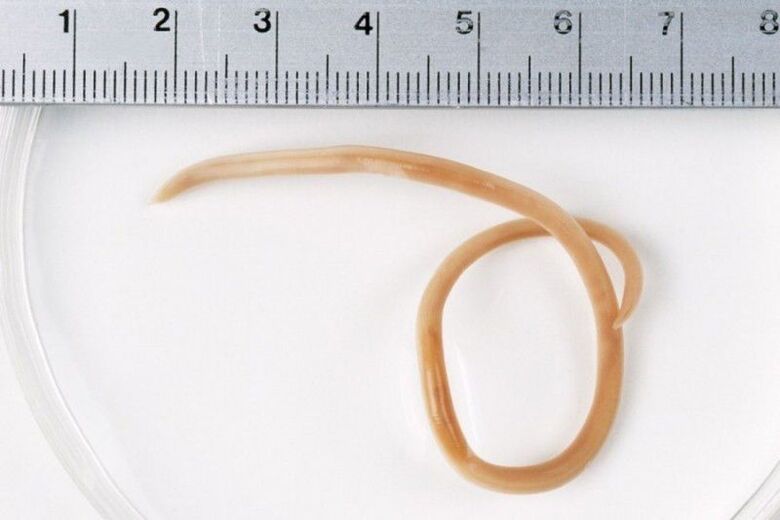
When worms enter the human body, they begin parasitic activities, thereby making people feel unwell. Helminth infections often cause severe allergies, gastrointestinal diseases and other diseases not related to the digestive tract. However, traditional treatments for these diseases do not bring about recovery. Worms in humans can be suspected with high probability based on certain symptoms, but helminthiasis only manifests clinically when the worms multiply massively. In the absence of symptoms, laboratory tests will help reliably diagnose helminthiasis. Symptoms of worms in humans can be different, but first of all are abdominal pain, discomfort near the anus, nausea and general malaise. To restore health, it is necessary to deworm with deworming medicine or folk remedies.
What are worms?
Worms are parasites of humans and animals belonging to the class flatworms or roundworms. Worms have a fairly common structure.
During development, traditional worms go through many stages: egg - larva - adult. Most worm infections occur when the person ingests worm eggs.

Eggs that enter the human intestinal tract quickly hatch into larvae, which begin to migrate to their permanent habitat, where they transform into adults. During migration, most helminths make real "travels" in the human body.
Only a few parasites (e. g. , pinworms) hatch from eggs in the intestinal tract and survive there; usually tissue and organ destruction and symptoms result from larvae and helminthic forms. Other developments during migration are most pronounced, compared to symptoms caused by adult parasites
As we said above, adult worms traditionally have a stable location in the body and their developmental forms often migrate to different organs and tissues and often their migration paths are quite complex. . For example, with ascariasis, a person becomes infected by eating food contaminated with ringworm eggs (roundworm eggs that ripen in the ground).

In the intestinal cavity, roundworm eggs hatch into larvae, which within a few hours penetrate the intestinal wall into the blood vessels and are carried into the lungs through the bloodstream. In the lungs, roundworm larvae develop and mature. The developing larva slowly gnaws into the neighboring bronchi and crawls along them, first into the trachea, then into the oral cavity, where it is again swallowed and introduced into the intestinal tract.
Roundworm larvae that return to the intestinal tract will transform into adult worms. Migration into the lungs of roundworm larvae is manifested by a variety of symptoms (coughing, asthma attacks, increased body temperature, allergic skin rashes) and the presence of small numbers of adult worms. intestinal wall may not manifest in any way.
What are worms? Worms have the scientific name helminths. Helminths means any type of worm that parasitizes the bodies of humans, animals and plants. Accordingly, worms are not a specific type of parasite but a group of different worms, of which there are three most common types.
Some scientists believe that almost the entire population on Earth is infected with some kind of parasitic worm. However, in this case, helminth infections must be the most common in the world, and moreover, several serious studies prove that in fact everything is not so bad. But the thought that a person still has helminths makes him immediately look for an answer to the question of how to get rid of worms.

It is also important to understand that helminth infections are not rare or trivial. There are more than three hundred species, human larvae penetrate further into the intestines and continue to develop there, gradually poisoning the body. Let's find out what the symptoms of worms in humans are, because what is foretold, as we know, is foretold. And then we will find out how to get rid of worms effectively and what is needed to ensure they do not return.
It is really easy to determine the presence of worms in the body of any person - you just need to do a stool test. However, the problem is that most people do not even think about undergoing such a test. The problem is that helminths in adults and children manifest themselves in the form of a large number of diseases, and at first they do not reveal their presence at all.
One could spend years treating the intestines, liver, kidneys, stomach, gallbladder and the root of the evil would be helminths and parasites, it feels great not to have to fight.
Often, the invasion of helminths causes the development of diseases that have nothing to do with helminths. And in this case, you can be treated endlessly if you do not understand in time what is happening.
All this proves that worms are not just an unpleasant phenomenon. And with the presence of so many ways of infection, knowing the signs of worm infection in humans is extremely important.
How do worms (parasites) appear?
Symptoms of helminthiasis depend on the stage of development of the parasite. The development of helminths is often divided into acute and acquired stages.
- The acute stage of parasite development begins from the moment the patient becomes infected with worms and lasts 2-3 weeks (in severe cases - up to 2 months).This stage is characterized by the dominance of allergic manifestations (rash, dry cough, choking, blood eosinophilia), which develop in response to the appearance of antigens (fragments) of larvae moving in the blood. The immune response is very pronounced at the stage when the initial parasite forms (larvae) are still in the infected person's body;
- The developmental phase of helminths occurs after the acute phase and lasts several weeks, months or years (for some helminthiasis - up to 10 years).The symptoms of this stage for us depend on the location of the worms, their number and feeding habits.
In places where they spread, the parasites damage tissues with their fixation organs (hooks, spines, cutting discs, epidermal spines). The damage causes tissue irritation and the development of an inflammatory response.
Some rapidly growing parasites, such as hydatid cysts or hydatid cysts, exist in the brain, eyeball and liver, compressing surrounding tissues, often causing dysfunction of vital organs, lead to serious consequences.

During the acquired stage of helminthiasis, metabolism is disrupted as the parasite continuously absorbs valuable nutrients such as proteins, minerals, carbohydrates and vitamins. In addition, the absorption of digested food in the intestinal tract is disrupted. The acquired stage in most cases of gastrointestinal helminth infections is usually asymptomatic, especially in cases where the parasite is a single individual.
Any symptoms of the disease appear only when the parasite is large, such as roundworms or tapeworms.
With other helminthic diseases, for example, with helminthiasis, nocturnal itching in the anal area may appear; Strong invasion of trihurosis contributes to the development of hemorrhagic colitis; In children, symptoms of rectal prolapse may appear.
How can you get worms?
You can get parasites in many different ways. In this case, the worms carried by the larvae are almost invisible to the naked eye.
The main methods of infection:
- lack of hygiene skills - dirty hands, working on the ground;
- eating food infected with helminths - unwashed fruits and food that the husband has eaten, as well as meat and fish with insufficient heat treatment (grilled meat, rare steaks, smoked foods, sushi, etc. );
- drinking unboiled water contaminated with worm eggs;
- contact with animals that are natural reservoirs of worms - cats and dogs, wild animals (hunting, fishing, working on fur farms);
- contact with a person with helminthiasis - shaking hands, through bed sheets, doorknobs, etc. v.
In what organs can worms live?
Helminth parasites are divided into two types, corresponding to the site of activity in the donor's body:
- cave- Worms live in many places in the digestive tract. There are about 100 species of intestinal parasites, and each part of the intestine has several dozen species. The small intestine is ready to receive roundworms, helminths, broad tapeworms and other less common "cousins". The small intestine will "share living space" with pinworms, dwarf tapeworms and other species. The medical literature describes cases where a person was simultaneously infected with multiple parasites;
- cloth- Worms reside in organs, tissues and even in the blood. Modern medicine successfully copes with paragonimiasis (lungs), hydatid disease (brain), echinococcosis (liver) and filariasis (lymphatic vessels). Some worm larvae travel throughout the body through the circulatory system and randomly attach to any organ. If multiple eggs are introduced, the entire body can become infected.
How can you get worms?
To protect yourself, you need to know 4 ways to spread and become infected with worm eggs:
- through soil and water - helminthiasis. They grow in sand, soil and water, then enter the human body and begin to lay eggs there. Next, the worm eggs enter the external environment along with feces and wait in the wings to infect new people. Eating unwashed fruits and vegetables, dirty hands, and dust on food can cause the patient to become infected with helminths. Some parasite eggs enter the human body through the skin of the feet and ankles;
- through direct contact.Worms in pets and humans are transmitted through hand contact, games and general activities.
- through the consumption of contaminated food of animal origin - biological helminthiasis. Eating raw and lightly processed meat (grilled meat, lard, preserved meat, home-cooked wild game) and fish (sushi, dried fish, preserved fish) is potentially dangerous. There is a possibility of intestinal infections and biological helminths;
- for insect bites. This type of infection is quite rare. These include intestinal myiases, cantarosis and fascioliasis. Do not confuse parasite eggs and insect larvae, which are also deposited under animal and human skin (for example, horsefly larvae).
Symptoms of worms
To understand how to remove worms from your body, you should know the symptoms of each type of tapeworm. Depending on the location of the dislocation, helminth infection can be:
- bright.Types of intestinal worms live in the small and large intestines. For example, the area where roundworms and tapeworms are found is the small intestine. Pinworms live in the lower part of the small intestine, whipworms live in the large intestine;
- muscle (cell).They live in muscle cells, lung tissue, brain cells, liver, lymph nodes, and eyes. Some types of worms have a living and cellular form, because in the early stages, they move through the blood circulation and reside in the above organs.
Symptoms of worms in adults can vary. As mentioned above, they are often easily confused with signs of other diseases. In some cases, everything follows the classic scenario of mass infection. In this case, the signs of worm infection in adults and children will most likely be the same in children - more obvious.
Symptoms of worm infection are clear: anal itching, especially at night; sudden weight loss or, conversely, weight gain; anemia, external manifestation is pale skin; tired, haggard appearance.
If you or your child begins to experience such a phenomenon, you should definitely see a doctor and ask to be tested for the presence of parasite eggs in the stool. Of course, it may not be their fault. Symptoms of helminth infection are not always the cause of poor health, but talking to a doctor will be useful in any case, since disorders in the body are obvious.
Symptoms of worms in humans, first signs
The first signs of worms in humans are always absent. Symptoms of parasitic infection only appear when there are large numbers of worms (pinworms, roundworms) or large tapeworms, for example. The clinical picture of helminth disease often resembles gastrointestinal disease.
However, in addition to the characteristics of gastrointestinal damage, there are also warning signs of dysfunction of other organs.
Symptoms indicating the presence of helminths in the body:
- loss of appetite or, conversely, gluttony, bitterness in the mouth and excessive salivation;
- strong desire to eat sweets (worms eat carbohydrates);
- nausea, vomiting - sometimes worms crawl into the stomach or their parts (segments) are found in vomit;
- Anal itching and teeth grinding during sleep often indicate intestinal disease;
- unstable stool - always causes disturbances in intestinal physiology, helminthiasis occurs with frequent changes of diarrhea and constipation, with significant infestation, worms can be excreted in the stool;
- flatulence - bloating and rumbling in the stomach are caused by toxins produced by worms;
- periodic abdominal pain - diffuse, often localized in the navel area, the pain is sometimes spastic;
- manifestations on the skin - sudden allergic rashes and pus formation (acne, pimples), due to a decrease in local immunity and elimination of toxins through the skin, often occur in severe form, at the same timeWeak and overexposed nails. hair loss;
- irritable bowel syndrome - impaired absorption of nutrients leading to anemia and weight loss, especially with many helminth colonies;
- Cough is a dry symptom that occurs in the pulmonary stage of helminthiasis (ascaris larvae enter the lungs with the blood), severe infection can cause pneumonia;
- obesity - strangely enough, can also be triggered by intestinal parasites, which when eaten carbohydrates cause blood sugar levels to plummet and force people to consume more food, while the body stores the substancefat for storage;
- symptoms from the nervous system - increased irritability, poor sleep or drowsiness, constant depression, decreased attention and memory problems are especially pronounced in children with helminthiasis;
- chronic fatigue syndrome - the parasite often causes constant weakness, a prolonged increase in temperature to 37-37. 5 C, a flu-like condition and muscle pain;
- pathology of the upper respiratory tract - a slow runny nose, a cough that does not go away, even pneumonia and asthma are often due to the presence of helminths;
- reduced immunity - accompanied by helminthiasis, intestinal dysbiosis and chronic intoxication leads to frequent colds and pathologies that are signs of immunodeficiency (herpes, warts, etc. ), including cancer.
The effects of helminths on the nervous system deserve special attention. Any parasite in the process of its life produces products that the body perceives as foreign substances. Their toxic effects primarily affect the nervous system, causing irritability, depressive states and other disorders of emotional stability.
Planar parasite in humans. Symptom
Fluke

Trematodes are found in the hepatic duct. Causes cancer of the digestive organs. You can become infected by eating raw, lightly salted fish products. Symptoms of worm infection in adults: increased body temperature; vomiting; indigestion; pain in the spleen and liver; allergy. Patients often feel dizzy and have disturbed sleep; Migraines are observed; he became irritable; Mood changes frequently. Treatment for helminthiasis is carried out in the hospital.
schistosomiasis
Routes of schistosomiasis infection include swimming in charging ponds and drinking dirty water. Parasitic in small veins of the large intestine, abdominal cavity, pelvis, uterus, and bladder. May be localized in the brain.
Symptoms of worm infection include loss of appetite; disruption of the digestive system; pale skin; stomach-ache; indigestion; Intestinal and uterine bleeding, weight loss, intestinal obstruction. In women, it causes irregular menstruation; Miscarriages have been recorded during pregnancy due to the presence of worms.
Men are impotent; decreased sperm quality (infertility). Children have delayed growth and mental development. When brain cells are damaged, consciousness is impaired, paralysis and seizures may occur. Such a condition can be fatal
exemplary

Paragonom - lung fluke: cause of worms in humans: due to eating crab, fish, freshwater pork. Worms affect the bronchial organs and lungs. Signs of helminths in adults: increased temperature; the person starts coughing and coughs for a long time.
When you cough, you will have phlegm. Migraines are observed; Shortness of breath occurs without movement; visual impairment; every bout of vomiting.
Echinococcus
Echinococcus is a very dangerous tapeworm. May cause death. It lives next to a person for a long time and is unlikely to express itself. The route of infection is through pets, usually dogs. A person becomes infected without following the rules of hygiene.
Echinococcus causes the development of cysts in human organs. Treatment of worms in adults is carried out only surgically. Often affects the digestive system, respiratory system, brain, and bone tissue. Symptoms in adults depend on which organs are affected.
Liver: pain in this area, different nature, heaviness, fatigue, skin allergies, jaundice. Lungs: sternum pain, intermittent cough, difficulty breathing. Brain: migraine, dizziness, paralysis, mental disorders, epilepsy. Bones: muscle and joint pain; Fractures are frequently observed.
Broad tapeworm

Broad tapeworms are one of the largest parasites. Lives in the small intestine. The route of infection is eating light caviar, fish that has not been properly heat treated.
Worms in the human body are characterized by frequent vomiting; pain in the abdomen; indigestion; lack of appetite; Tired; anemia; hypotension; migraine headache. Furthermore, sometimes the pain is so strong that it makes you faint.
Beef tapeworm
Beef tapeworm: entry route is infected beef. Helminth infestation invades the small intestine. How to understand that an infection has occurred? Signs of worm infection in humans: abdominal pain; severe nausea; excessive increase in appetite; losing weight; rumbling in the stomach; bloating; increased frequency of bowel movements.
Pork tapeworm

Pork tapeworms live in many different organs. The route of infection is lack of hygiene and unwashed fruit. You can identify a person with worms by dizziness and persistent and frequent migraines. The person does not sleep well, often wakes up in a "cold sweat" due to nightmares, and thus becomes irritable over time. Appetite is disrupted and belching occurs.
Dwarf tapeworm
Dwarf tapeworms enter humans through the oral cavity with dirty fruits and vegetables. Lives in the small intestine. Symptoms: fever, nausea, salivation, belching, heartburn, rhinitis, dry mucous membranes.
Roundworms in humans. Symptom
roundworm
Roundworms: you can get infected after eating unwashed vegetables and fruits. Tapeworms live in the small intestine. Signs of worms in humans: the anus is itchy, the patient feels the worms move, causing discomfort. The temperature may increase, lymph nodes may swell, and headaches may occur in the evening. Enlarged liver, allergic symptoms (hives on feet and hands, dermatological disease). Due to damage to the central nervous system, mental disorders occur - depression, convulsions, aggression, nightmares at night. Digestive activity is interrupted.
Pinworm
Pinworm: this parasite starts from dirty hands. Lives in the human large and small intestines. The source of infection is sick people and non-compliance with hygiene standards.
First signs of worms: itching in the anal area (more itching at night); I have a stomachache; sick; disturbed sleep. People are restless and irritable; get tired quickly.
Some people experience urinary incontinence in this setting; allergic manifestations. Girls infected with worms will have a lot of vaginal discharge.
Trichinella
Trichinella is a dangerous helminth. Symptoms do not always appear immediately. Infection route: eating pork, vegetation near grasslands. Helminth infections affect all systems and organs without exception.

The following symptoms cause worms in humans: loss of appetite; people constantly feel nauseous and the gag reflex occurs periodically. The stool is disturbed and there is pain in the abdomen. A distinctive feature is facial swelling. Muscle pain; rash appears on the skin; Increased temperature.
Hookworms
Hookworm is a dangerous worm in adults. Symptoms may be severe or absent. The gastrointestinal tract (small intestine, duodenum) is affected. Infection route: contact with soil where larvae are present; through the mouth with vegetables and herbs contaminated with soil.
Signs of worms: allergic, itchy skin; coughing spells (blood streaks visible in sputum); increased body temperature, migraine. People feel dizzy and feel weak; bone pain (as with ARVI). I have to endure hunger.
After eating, the patient feels nauseous and may vomit. Almost after eating, my stomach swells and my stomach aches. After eating, diarrhea appears two hours later. On the contrary, many people suffer from constipation due to impaired intestinal motility caused by worms. A person becomes sleepy and fatigue appears even without physical activity.
Should I use deworming medicine to prevent disease?
If one of the family members is infected with pinworms, preventive treatment is always carried out for the whole family.
Indications for using antihelminthic prophylaxis:
- presence of pets;
- frequent contact with the ground (playing in the sand, villagers);
- if children live permanently in closed child groups;
- frequent trips to foreign countries;
- Hobbies: fishing, hunting, beach volleyball, soccer.





























